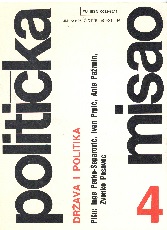Kriza države općeg blagostanja
The Crisis of the Welfare State
Author(s): Inge Perko-ŠeparovićSubject(s): Political Theory, Economic policy, Welfare systems, Interwar Period (1920 - 1939)
Published by: Fakultet političkih znanosti u Zagrebu
Keywords: Crisis; Welfare State;
Summary/Abstract: The economic depression of the 1930s created the preconditions for the making of the welfare state. Its theoretical expressions arc Keynes’s economic doctrine and Parson's theory of functional imperatives. These provided the theoretical arguments for the state’s intervention into the economic and social area. The current economic crisis has brought the concept of the welfare state into question. A way out is being sought again through an affirmation of the economic policy of liberalism (Reaganomics, Thatcherism). The neoliberal model however does not take into account that the relationship between the natural environment and the economic system has been disturbed on a world¬-wide scale. It therefore does not offer a genuine way out of the global crisis. Alternative theoretical models call into question the existing system of values and power structure. Such a model is L. Brown's economic model of a sustainable society. In order to create economic and political relationships that will take into account genuine human needs it will be necessary to alter the fundamental structures of the community. J. Caitung's model suggests the possibilities and forms of such a transformation which will have to take place in terms of a democratic process.
Journal: Politička Misao
- Issue Year: XXIV/1987
- Issue No: 04
- Page Range: 5-12
- Page Count: 8
- Language: Croatian

